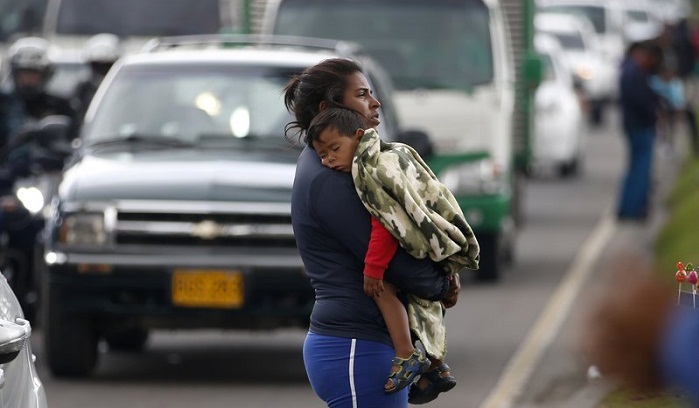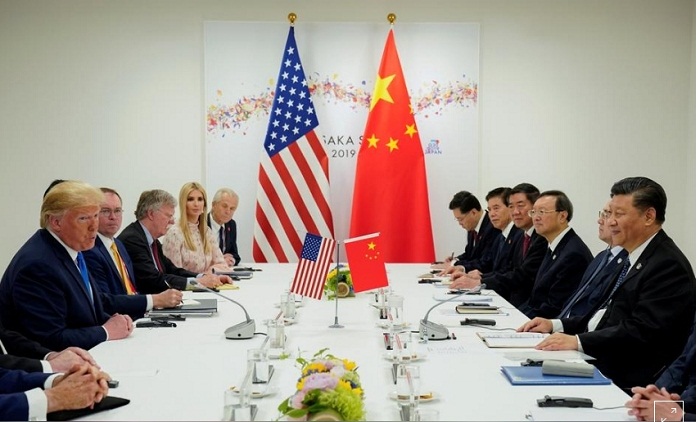Impact of economic and social crisis: Venezuelan children on spend hours on the road :UNICEF
Editor Express Daily April 5, 2020 0 COMMENTS
Colombia (AP) — Across Colombia’s capital, Venezuelan children, including infants, spend hours at busy intersections while their migrant parents sell candy or ask motorists for a few coins to get through another day after fleeing their homeland in search of a better life.
The impact of Venezuela’s devastating economic, social and political problems has rippled across Latin America and the Caribbean in recent years as more than 3 million people left the country. As is the case in humanitarian emergencies around the world, it is the children who are most vulnerable.
About 1.1 million children will need access to services such as education, sanitation and safe drinking water across the region this year because of the Venezuelan migrant crisis, UNICEF says in a new report. The U.N. children’s agency said the projected figure is more than double the number of children who need such help right now, and it expressed concern about reports of discrimination and violence against Venezuelan children and families.
“Some migrants — including unaccompanied and separated children, pregnant women, nursing mothers as well as indigenous people — are at increased risk,” UNICEF said in an appeal to governments to uphold the rights of children, including migrants and refugees.
On Thursday, about 20 Venezuelan babies and children were with parents scrounging for handouts from passing vehicles at an intersection in Bogota. Mothers carried their babies. The youngest child was six days old, the oldest was 6 years old. Toddlers played with toys or ate candy, seemingly oblivious to the roar of traffic around them. Some motorists rolled down their windows to give out a few coins.
One of the migrants, Wilfran Garrido, 22, said he had worked at a hotel in Venezuela’s Carabobo state but left the country because of the deteriorating economic situation that made it hard to feed his family. He said he arrived in Bogota last year and was able to find a school for his 4-year-old son and a kindergarten for his 2-year-old. He and his wife also have an infant 4 months old.
“I hope the future is better for my three children, because there is no future in Venezuela,” said a tearful Garrido.
Like many Venezuelans, Garrido walked over the border from Venezuela to the Colombian border city of Cucuta, scene of a Feb. 23 attempt by Venezuelan opposition leader Juan Guaidó to deliver U.S.-provided humanitarian aid to his country. That effort failed when Venezuelan President Nicolas Maduro ordered security forces to stop the aid, in an escalating political standoff that began when Guaidó declared himself interim president in January and started a campaign to remove Maduro from power.
Oriana Garcia, 24, was with her 6-year-old daughter at the Bogota intersection. Garcia said Venezuela wasn’t “livable” at the moment and, like many migrants, she blamed Maduro for the country’s problems.
“What we sell here pays for lodging, it barely covers food,” Garcia said of her attempts to sell trinkets to people in passing cars. She said some Colombians have treated her badly and others have been kind.
UNICEF cited projections that up to 4.9 million people across the region — including Brazil, Colombia, Ecuador, Guyana, Panama, Peru, and Trinidad and Tobago — will need help this year because of “political and economic conditions inside Venezuela that are driving regional migration.”
It urged governments to register children on the move, a step that guarantees their rights and helps in the planning and budgeting of an aid response.
Charlie Lopez, a 26-year-old Venezuelan at the Bogota intersection, said he feels his family, including partner Jennifer Salas, 27, and their three daughters, are better off in Colombia for now. Lopez used to sell drinks and coconuts on the beach and worked in tourism in Venezuela, but opportunities dried up as hyperinflation hit, the economy tanked and social services collapsed.
“We prefer to be here in Bogota because we get something to eat every day,” he said. “I hope that soon my country will get better and I’ll be able to return to Venezuela.”
RELATED ARTICLES
Recent Posts
- Big arrangements are made by a nervous Harris campaign to secure a close victory.
- Assault on peace: Hammas deadliest attack on israle on Oct 07 , instigated Midle East Crisis:
- Israel marked “solemn” anniversary commemorating 7/10 deadly attacks:
- Trump impeachment: Trump lashed out over his impending impeachment in an irate letter to Nancy Pelosi, accusing her of declaring “open war on American democracy”.
- hotness breaks its records in Australia :


